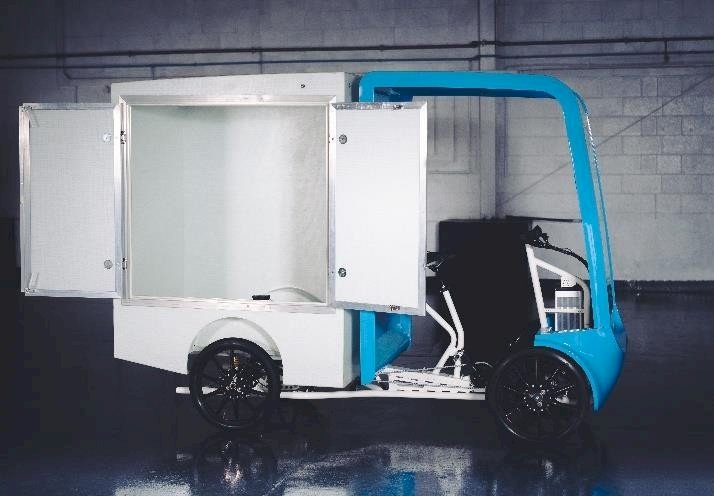EAV launched truely revolutionary new ecargo chassis cab platform
With all the latest models and two cubic meter REAR FIXED BOX, Latest ECOBike aims to minimize City pollution by up to 75%

On 29th July, Electric Assisted Vehicles Limited has released its all-new ultra-lightweight commercial vehicle EAV 2Cubed eCargo, based on EU eCargo regulations. The new vehicle integrates a completely different chassis-cab configuration that provides several options for the vehicle's rear, which will now become the foundation of the future development of EAV. The goal of EAV is to provide, among other things, city-based logistics, food and drink distribution, facilities maintenance, utilities and even traders with a more effective, cheaper and much healthier form of commercial transport that significantly reduces emissions of carbon and particulate matter. The new 2Cubed fixed box, which provides a full two cubic meters load volume with a fully adaptable internal shelfing system, is mounted to the rear of the new EAV package. The 2Cubed 's production is in direct response to the dramatic increase in customer deliveries over the past six months.
Founded in 2018 with the goal of engineering the fastest, safest, most powerful, reliable and durable eCargo vehicles using the skills of motorsport and aerospace engineering, EAV is based in the UK just outside Oxford. The first EAV model, the EAVan P1, which was released in 2019, is now considered to be one of the most popular, safe and reliable eCargo bikes available and is currently helping to reduce CO2 rates in various European cities. Described by the company as 'engineered from a van rather than a bicycle,' the EAV 2Cubed now takes to the next level the increased efficiency and environmental benefits of zero emissions and lightweight commercial vehicle architecture, enabling and encouraging national and regional legislation to advance the ongoing reduction in the use of vehicles and goods vehicles in cities and towns.
“EAV is an advanced micro-mobility design , engineering and vehicle manufacturing company that uses simplicity and light weight to solve a major and highly complex transportation, business efficiency and social issue within urban environments. "commented Adam Barmby, CEO and founder of EAV. "The emergence of electric bike technology has meant that we can now use a bio-mechanical hybrid electric vehicle, such as the EAV 2Cubed, to replace most vans and even cars in urban environments without any loss to the user or driver in terms of business performance or discomfort."
The EAV 2Cubed is the next move forward for EAV in its market growth strategy 'eavolution' integrating the chassis-cab EAV package with a 2m3 fixed rear box capable of holding 20 percent of the power of a Ford Transit diesel engine. For direct contrast, Transport for London Research[1] has reported that 40 per cent of vans, such as the ubiquitous Transit, use just 25 per cent of their capacity on average, making the new EAV 2Cubed a real option and solution to a large proportion of London commercial vehicle traffic. The 2Cubed 's maximum payload is currently 150 kg (plus rider), but a new wheel and tyre kit will be revealed in the near future substantially the weight carrying capacity.
“The new EAV chassis cab and 2Cubed fixed box is a major step forward for sustainable lightweight commercial goods vehicles in cities and towns, "Adam Barmby added. "We can honestly see a time when most urban commercial and even personal traffic is based on the concept of an EAV chassis-cab and we already have a solution to almost every conceivable use of road transport. We don't need to make the atmosphere worse in our modern post-COVID world, we need it to be safer and healthier and the EAV eavolution plan will go a long way towards that. We also need to reform broader thought and culture about travel, a process that has, significantly, already started.”
At EAV's UK manufacturing facility in Upper Heyford, near Oxford, the EAV 2Cubed is already in service with some blue-chip customers currently taking deliveries. Multiple trials in Europe and North America are already underway or imminent, and a major international distribution agreement is under discussion.




























